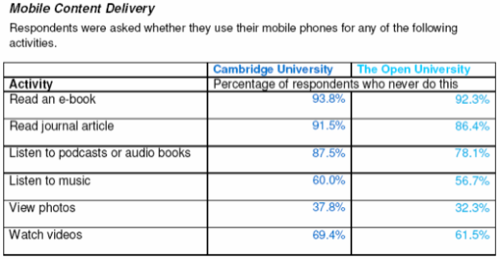According to a new report from Cambridge University (PDF), students aren’t interested in being able to read eBooks and eJournals on their mobile phones. Instead, users are far more interested in opening hours, location maps, contact info, and access to the library catalog. Most respondents were also far more interested in getting alerts by text message than being able to use library resources over the mobile web.


Editor’s note: This story is part of a series we call Redux, where we’ll re-publish some of our best posts of 2009. As we look back at the year – and ahead to what next year holds – we think these are the stories that deserve a second glance. It’s not just a best-of list, it’s also a collection of posts that examine the fundamental issues that continue to shape the Web. We hope you enjoy reading them again and we look forward to bringing you more Web products and trends analysis in 2010. Happy holidays from Team ReadWriteWeb!
According to the researchers, libraries that serve colleges should invest in text alerting services, and text reference services instead of mobile web services. With text alerting services, users could receive alerts when books are due, for example, while text reference services would give students access to the library reference desk over SMS. The report also advises libraries to allow mobile phone use in their buildings, “as long as they are set to silent or to flight mode.”
It is important to note that the researchers only surveyed users at Cambridge University and the Open University, so these results are somewhat skewed and only apply to the U.K., where text messaging is even more prevalent than in the United States.

The report, however, also found that users of more advanced phones like the iPhone are far more inclined to read e-books on their phones than users of feature phones (no surprise there, given the difference in screen estate and quality). In the end, though, the report argues that it is currently “not worth libraries putting development resource into delivering content such as e-books and e-journals to mobile devices at present.”
Too Conservative?
While these recommendations seem reasonable based on the survey data, we agree with Lorcan Dempsey, a library blogger and Vice President of OCLC, who argues that with the advent of better eReaders and the iPhone, these survey results will probably look very different in just a few years from now.
As Sarah Bartlett from the Panlibus blog points out, the recommendations in this report are anchored in the past (getting SMS alerts about due books, for example), while now would be a good time to “re-imagine the library and its services.”
While some libraries are often conservative when it comes to adopting new technologies, we would think that starting to adopt some of these technologies like e-books and better mobile services now would help these institutions to remain relevant in a future where those large buildings in the middle of campus are already turning more into places for study groups to meet up and grab a cup of coffee than centers of academic research.

CC-licensed image used courtesy of Flickr user umjanedoan.










